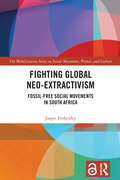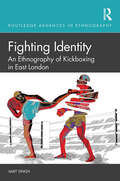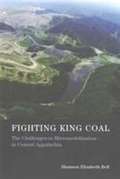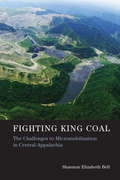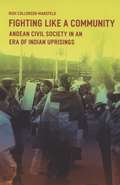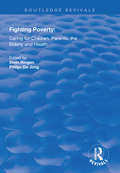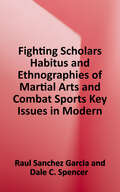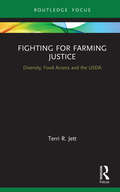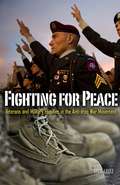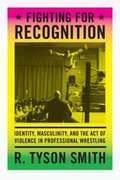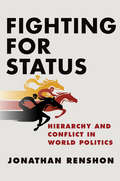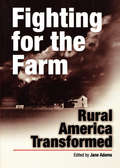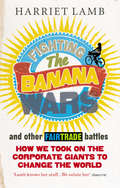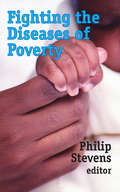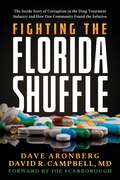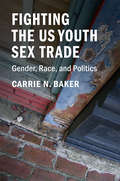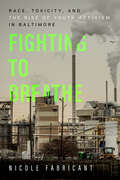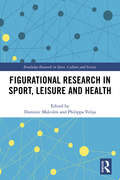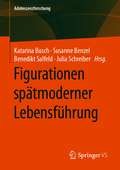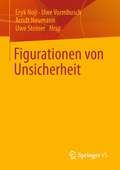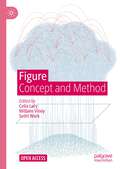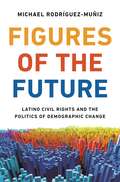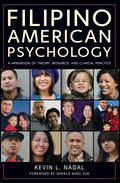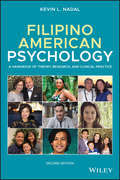- Table View
- List View
Fighting Global Neo-Extractivism: Fossil-Free Social Movements in South Africa (The Mobilization Series on Social Movements, Protest, and Culture)
by Jasper FinkeldeyFighting Global Neo-Extractivism: Fossil-Free Social Movements in South Africa analyzes social struggles over damaging new fossil fuel projects in the Global South with a focus on South Africa, Africa’s biggest fossil fuel emitter. Fossil fuel extraction in South Africa has reached a new accelerated phase in which the fossil fuel frontier is moving beyond historical ‘sacrifice zones’ into non-traditional spaces, such as conservation parks and middle-class neighbourhoods, and provoking fervent opposition from grassroots activists. This book examines campaigns such as Frack Free South Africa and Save our iMfolozi Wilderness, viewing them as struggles against neo-extractivism driven by the state and industry. Through a series of detailed case studies, it highlights the shaping of mobilisation patterns by prior land use practices and the capacity to mobilize different social groups across race and class. Developing the notion of the fossil fuel frontier as the material and political boundary that activists in South Africa and elsewhere in the world render visible, this volume provides a theoretical framework to understanding global mobilization patterns. This timely and impassioned book will appeal to students and researchers interested in a range of subjects, including environmentalism, social movements, political ecology, and development studies.
Fighting Identity: An Ethnography of Kickboxing in East London (Routledge Advances in Ethnography)
by Amit SinghThis book is an immersive ethnographic account of how fighters at a Polish-owned Muay Thai/kickboxing gym in East London seek to reject prior identity markers in favour of constructing one another as the same, as fighters, a category supposedly free from the negative assumptions and limitations associated with prior ascriptions such as race, class, gender and sexuality. It explores questions of subjectivity and identity by examining how and why fighters sought to disavow identity, which involved casting aside pre-established ways of thinking, feeling and acting about constructed differences to forge deep bonds of carnal convivial friendships. Yet, this book argues that becoming a fighter is highly socially contingent and remains subject to rupture due to the durability of taken-for-granted thinking about race, gender and sexuality, which, if drawn upon, could pull people out of the category of fighter and back into longer-standing durable categories. This book deploys Butler's theory of performativity and Bourdieu's conceptualisation of habitus to explore the context-specific ways people transgress identity whilst remaining attentive to the constrained nature of agency. The book is intended for undergraduate and master's students on courses looking at race, racism, gender, social anthropology, sociology and sociology of sport.
Fighting King Coal: The Challenges to Micromobilization in Central Appalachia
by Shannon Elizabeth BellIn the coal-mining region of Central Appalachia, mountaintop-removal mining and coal-industry-related flooding, water contamination, and illness have led to the emergence of a grassroots, women-driven environmental justice movement. But the number of local activists is small relative to the affected population, and recruiting movement participants from within the region is an ongoing challenge. In Fighting King Coal, Shannon Elizabeth Bell examines an understudied puzzle within social movement theory: why so few of the many people who suffer from industry-produced environmental hazards and pollution rise up to participate in social movements aimed at bringing about social justice and industry accountability. Using the coal-mining region of Central Appalachia as a case study, Bell investigates the challenges of micromobilization through in-depth interviews, participant observation, content analysis, geospatial viewshed analysis, and an eight-month "Photovoice" project -- an innovative means of studying, in real time, the social dynamics affecting activist involvement in the region. Although the Photovoice participants took striking photographs and wrote movingly about the environmental destruction caused by coal production, only a few became activists. Bell reveals the importance of local identities to the success or failure of local recruitment efforts in social movement struggles, ultimately arguing that, if the local identities of environmental justice movements are lost, the movements may also lose their power.
Fighting King Coal: The Challenges to Micromobilization in Central Appalachia (Urban and Industrial Environments)
by Shannon Elizabeth BellAn examination of why so few people suffering from environmental hazards and pollution choose to participate in environmental justice movements. In the coal-mining region of Central Appalachia, mountaintop-removal mining and coal-industry-related flooding, water contamination, and illness have led to the emergence of a grassroots, women-driven environmental justice movement. But the number of local activists is small relative to the affected population, and recruiting movement participants from within the region is an ongoing challenge. In Fighting King Coal, Shannon Elizabeth Bell examines an understudied puzzle within social movement theory: why so few of the many people who suffer from industry-produced environmental hazards and pollution rise up to participate in social movements aimed at bringing about social justice and industry accountability. Using the coal-mining region of Central Appalachia as a case study, Bell investigates the challenges of micromobilization through in-depth interviews, participant observation, content analysis, geospatial viewshed analysis, and an eight-month “Photovoice” project—an innovative means of studying, in real time, the social dynamics affecting activist involvement in the region. Although the Photovoice participants took striking photographs and wrote movingly about the environmental destruction caused by coal production, only a few became activists. Bell reveals the importance of local identities to the success or failure of local recruitment efforts in social movement struggles, ultimately arguing that, if the local identities of environmental justice movements are lost, the movements may also lose their power.
Fighting Like a Community: Andean Civil Society in an Era of Indian Uprisings
by Rudi Colloredo-MansfeldThe indigenous population of the Ecuadorian Andes made substantial political gains during the 1990s in the wake of a dynamic wave of local activism. The movement renegotiated land development laws, elected indigenous candidates to national office, and successfully fought for the constitutional redefinition of Ecuador as a nation of many cultures. Fighting Like a Community argues that these remarkable achievements paradoxically grew out of the deep differences--in language, class, education, and location--that began to divide native society in the 1960s. Drawing on fifteen years of fieldwork, Rudi Colloredo-Mansfeld explores these differences and the conflicts they engendered in a variety of communities. From protestors confronting the military during a national strike to a migrant family fighting to get a relative released from prison, Colloredo-Mansfeld recounts dramatic events and private struggles alike to demonstrate how indigenous power in Ecuador is energized by disagreements over values and priorities, eloquently contending that the plurality of Andean communities, not their unity, has been the key to their political success.
Fighting Poverty: Caring for Children, Parents, the Elderly and Health (Routledge Revivals)
by Stein Ringen Philip R. DejongFirst published in 1999, this volume is the fifth in a series on international studies of issues in social security. The series is initiated by the Foundation for International Studies on Social Security (FISS). One of its aims is to confront different academic approaches with each other, and with public policy perspectives. Another is to give analytic reports of cross-nationally different approaches to the design and reform of welfare state programs.
Fighting Scholars: Habitus and Ethnographies of Martial Arts and Combat Sports (Key Issues In Modern Sociology Ser.)
by Dale C. Spencer Raul Sanchez GarciaFighting Scholars brings to the fore the ethnographic study of combat sports and martial arts as a means of exploring embodied human existence. The book's main claim is that such activities represent privileged grounds to access different social dimensions, such as emotion, violence, pain, gender, ethnicity and religion. To explore these dimensions, the concept of 'habitus' is presented prominently as an epistemic remedy for the academic distant gaze of the effaced academic body. The different contributions of this volume are aligned within the same project that began to crystallize in Loïc Wacquant's 'Body and Soul': the construction of a 'carnal sociology' that constitutes an exploration of the social world 'from' the body. The book is divided into three sections. In the first section, the editors introduce the field, providing a typology of existing literature. The second section contains the contributions of the authors, discussing their respective approaches to embodied ethnography, their use of the concept of 'habitus', and ethnographic findings. The third section contains a conclusion by the editors - reflecting on existing conceptions of 'habitus' and interdisciplinary possibilities for rethinking the concept - and an epilogue by Loïc Wacquant critically assessing the whole volume.
Fighting for Farming Justice: Diversity, Food Access and the USDA (Earthscan Food and Agriculture)
by Terri R. JettThis book provides a detailed discussion of four class-action discrimination cases that have recently been settled within the United States Department of Agriculture (USDA) and have led to a change in the way in which the USDA supports farmers from diverse backgrounds. These settlements shed light on why access to successful farming has been so often limited to white men and/or families, and significantly this has led to a change for opportunities in the way the USDA supports famers from diverse backgrounds. With chapters focusing on each settlement Jett provides an overview of the USDA before diving into a closer discussion of the four key settlements, involving African American farmers (Pigford), Native Americans (Keepseagle), Woman famers (Love) and Latino(a) farmers (Garcia), and the similarities between each. This title places and emphasis on what is happening in farming culture today, drawing connections between these four settlements and the increasing attention on urban farming, community gardens, farmers markets, organic farming and the slow food movement, through to the larger issues of food justice and access to food. Fighting for Farming Justice will be of interest to scholars of food justice and the farming arena, as well as those in the fields of Agricultural Economics, Civil Rights Law and Ethic Studies.
Fighting for Peace: Veterans and Military Families in the Anti–Iraq War Movement (Social Movements, Protest and Contention #40)
by Lisa LeitzFighting for Peace brings to light an important yet neglected aspect of opposition to the Iraq War—the role of veterans and their families. Drawing on extensive participant observation and interviews, Lisa Leitz demonstrates how the harrowing war experiences of veterans and their families motivated a significant number of them to engage in peace activism. Married to a Navy pilot herself, Leitz documents how military peace activists created a movement that allowed them to merge two seemingly contradictory sides of their lives: an intimate relation to the military and antiwar activism. Members of the movement strategically deployed their combined military–peace activist identities to attract media attention, assert their authority about the military and war, and challenge dominant pro-war sentiment. By emphasizing the human costs of war, activists hoped to mobilize American citizens and leaders who were detached from the wars in Iraq and Afghanistan, bring the wars to an end, and build up programs to take care of returning veterans and their families. The stories in Fighting for Peace ultimately reveal that America&’s all-volunteer force is contributing to a civilian–military divide that leaves civilians with little connection to the sacrifices of the military. Increasingly, Leitz shows, veterans and their families are being left to not only fight America&’s wars but also to fight against them.
Fighting for Recognition: Identity, Masculinity, and the Act of Violence in Professional Wrestling
by R. Tyson SmithIn Fighting for Recognition, R. Tyson Smith enters the world of independent professional wrestling, a community-based entertainment staged in community centers, high school gyms, and other modest venues. Like the big-name, televised pro wrestlers who originally inspired them, indie wrestlers engage in choreographed fights in character. Smith details the experiences, meanings, and motivations of the young men who wrestle as "Lethal" or "Southern Bad Boy," despite receiving little to no pay and risking the possibility of serious and sometimes permanent injury. Exploring intertwined issues of gender, class, violence, and the body, he sheds new light on the changing sources of identity in a postindustrial society that increasingly features low wages, insecure employment, and fragmented social support. Smith uncovers the tensions between strength and vulnerability, pain and solidarity, and homophobia and homoeroticism that play out both backstage and in the ring as the wrestlers seek recognition from fellow performers and devoted fans.
Fighting for Status: Hierarchy and Conflict in World Politics
by Jonathan RenshonThere is widespread agreement that status or standing in the international system is a critical element in world politics. The desire for status is recognized as a key factor in nuclear proliferation, the rise of China, and other contemporary foreign policy issues, and has long been implicated in foundational theories of international relations and foreign policy. Despite the consensus that status matters, we lack a basic understanding of status dynamics in international politics. The first book to comprehensively examine this subject, Fighting for Status presents a theory of status dissatisfaction that delves into the nature of prestige in international conflicts and specifies why states want status and how they get it.What actions do status concerns trigger, and what strategies do states use to maximize or salvage their standing? When does status matter, and under what circumstances do concerns over relative position overshadow the myriad other concerns that leaders face? In examining these questions, Jonathan Renshon moves beyond a focus on major powers and shows how different states construct status communities of peer competitors that shift over time as states move up or down, or out, of various groups.Combining innovative network-based statistical analysis, historical case studies, and a lab experiment that uses a sample of real-world political and military leaders, Fighting for Status provides a compelling look at the causes and consequences of status on the global stage.
Fighting for the Farm
by Jane AdamsIn North America industrial agriculture has now virtually displaced diversified family farming. The prevailing system depends heavily on labor supplied by migrants and immigrants, and its reliance on monoculture raises environmental concerns. In this book Jane Adams and contributors--anthropologists and political scientists among them--analyze the political dynamics that have transformed agriculture in the United States and Canada since the 1920s. The contributors demonstrate that people become politically active in arenas that range from the state to public discourse to relations between growers and their contractors or laborers, and that politics is a process that is intimately local as well as global.The farm financial crisis of the 1980s precipitated rapid consolidation of farms and a sharp decline in rural populations. It brought new actors into the political process, including organic farmers and environmentalists. Fighting for the Farm: Rural America Transformed considers the politics of farm policy and the consequences of the increasing alignment of agricultural interests with the global economy. The first section of the book places North American agriculture in the context of the world system; the second, a series of case studies, examines the foundations of current U.S. policy; subsequent sections deal with the political implications for daily life and the politics of the environment.Recognizing the influence of an array of political constituencies and arenas, Fighting for the Farm charts a decisive shift since the early part of the twentieth century from a discursive regime rooted in economics to one that now incorporates a variety of environmental and quality-of-life concerns.
Fighting the Banana Wars and Other Fairtrade Battles
by Harriet LambIt started very small and full of hope. But its daring campaigns have placed Fairtrade goods at the heart of the supermarket shelves. From bananas and coffee beans to cotton and chocolate, Fairtrade has grown to become an important global movement that has revolutionised the way we shop.As Harriet Lamb, Chief Executive of Fairtrade International, explains in this extensively revised and updated edition of her inspirational book, Fairtrade is about a better deal for workers and famers in the developing world. It's about making sure the food on our plates, and shirts on our backs, don't rob people in other countries of the means to feed or clothe themselves. She explores the journey, through an often unjust system, that Fairtrade items make from farm to consumer. And she uncovers the shocking cost of our demand for cheaper food.There is much still to be done. But by hard work and high ideals, Fairtrade is starting to transform the lives of over 7 million farmers, workers and their families, and is a powerful symbol of how extraordinary change can be achieved against all the odds - by us all.
Fighting the Diseases of Poverty
by Philp StevensPublic discussion of global healthcare issues is dominated by those who believe that top-down, government-driven interventions are the solution to the myriad health problems suffered by people in less developed countries. This thinking is responsible for a plethora of harmful policies, ranging from a drive towards socialized healthcare systems, to calls for the centralization and semi-nationalization of pharmaceutical research and development, to impractical but grandiose UN-sponsored schemes for tackling HIV/AIDS and malaria.In spite of the abysmal track record of top-down approaches, non-governmental organizations and UN agencies continue to promote them, to the detriment of the private sector, economic development, and human health. The resulting politicization of diseases such as HIV/AIDS has led to a diversion of resources away from more easily treatable diseases that affect more people. Meanwhile, cost-effective and simple interventions such as vaccination are being subordinated to other more politically correct diseases.This centralizing mindset has also resulted in many governments in less developed countries attempting to plan and control universal healthcare systems, which has encouraged rationing, inequitable access, and entrenched corruption. It has also seriously undermined the effectiveness of overseas development aid. Moreover, the politicization of diseases such as HIV/AIDS has led to a diversion of resources away from more easily treatable diseases that affect more people. As a result, cost-effective and simple interventions are neglected by donors.There has to date been little public discussion of the role of markets and their underlying institutions--property rights and the rule of law--in improving human health. Economic growth and globalization has led to unprecedented improvements in human health. The challenge is to enable the poorest countries to take part more fully in this process. This work demonstrates how current
Fighting the Florida Shuffle: The Inside Story of Corruption in the Drug Treatment Industry and How One Community Found the Solution
by Dave Aronberg M.D. David R. Campbell"An unflinching view into the dark side of an industry meant to be the hope of those caught in the grip of addiction..." - Dr. Jay Kuchera, MD, FASAMMotivated by greed, Purdue Pharma's explosive marketing of its powerful painkiller, OxyContin, helped create the opioid epidemic that kills over 200 people every day in the United States. Many more battle substance use disorders that impact health, happiness, family relations, and jobs. Federal policymakers have responded with laws that require insurance policies to cover drug treatment and classify addiction as a preexisting condition. But what happens when the rehab industry itself is corrupted, leading to the untimely death of individuals in their care? Fighting the Florida Shuffle is a gripping account of how unscrupulous players have infiltrated the drug treatment industry, and how well-intended, yet naïve policymakers continue to incentivize relapse over recovery. Former State Attorney Dave Aronberg and MSNBC Chief Medical Correspondent Dr. Dave Campbell tell the stories of victims enticed with free plane tickets and other illicit benefits to enter substandard outpatient rehab and live in flophouses masquerading as "sober homes," leaving too often in ambulances and body bags. The authors offer an insiders' perspective from the world of law enforcement and medicine on how corporate malfeasance fueled the rise in opioid overdoses, how families can identify and avoid rehab scams, and how one community fought back to clean up the industry and put the worst offenders behind bars. Drug treatment has become a thriving enterprise, but the profit motive has lured predators to exploit the vulnerable who seek help. As rogue rehab owners line their pockets through insurance fraud, patient brokering and illegal kickbacks, their victims leave behind grieving families and loved ones, who wonder how the insurance coverage thought to be a lifeline led to increased overdose and premature death.
Fighting the US Youth Sex Trade: Gender, Race, and Politics
by Carrie N. BakerCampaigns against prostitution of young people in the United States have surged and ebbed multiple times over the last fifty years. Fighting the US Youth Sex Trade: Gender, Race, and Politics examines how politically and ideologically diverse activists joined together to change perceptions and public policies on youth involvement in the sex trade over time, reframing 'juvenile prostitution' of the 1970s as 'commercial sexual exploitation of children' in the 1990s, and then as 'domestic minor sex trafficking' in the 2000s. Based on organizational archives and interviews with activists, Baker shows that these campaigns were fundamentally shaped by the politics of gender, race and class, and global anti-trafficking campaigns. The author argues that the very frames that have made these movements so successful in achieving new laws and programs for youth have limited their ability to achieve systematic reforms that could decrease youth vulnerability to involvement in the sex trade.
Fighting to Breathe: Race, Toxicity, and the Rise of Youth Activism in Baltimore (California Series in Public Anthropology #54)
by Nicole FabricantIndustrial toxic emissions on the South Baltimore Peninsula are among the highest in the nation. Because of the concentration of factories and other chemical industries in their neighborhoods, residents face elevated rates of lung cancer and other respiratory illnesses in addition to heart attacks, strokes, and cardiovascular disease, all of which can lead to premature death. Fighting to Breathe follows a dynamic and creative group of high school students who decided to fight back against the race- and class-based health disparities and inequality in their city. For more than a decade, student organizers stood up to unequal land use practices and the proposed construction of an incinerator and instead initiated new waste management strategies. As a Baltimore resident and activist-scholar, Nicole Fabricant documents how these young organizers came to envision, design, and create a more just and sustainable Baltimore.
Figurational Research in Sport, Leisure and Health (Routledge Research in Sport, Culture and Society)
by Dominic Malcolm Philippa VelijaFigurational sociology offers an important set of conceptual and methodological tools for helping us to understand sport, leisure and health and their relationship to wider society. This book brings together an international team of scholars working within the figurational tradition to explain the significance of figurational sociology in the development of the sociology of sport and to provide empirical case studies of figurational sociology in action. Covering core concepts such as the civilizing process, and key methods such as interviewing and ethnography, the book presents contemporary research in areas as diverse as sport-related health, mixed martial arts, sports policy, gender relations and cycling. Figurational Research in Sport, Leisure and Health is an important resource for students of sport and social sciences, sociology, figurational sociology and sociology of sport and exercise.
Figurationen spätmoderner Lebensführung (Adoleszenzforschung #10)
by Susanne Benzel Julia Schreiber Benedikt Salfeld Katarina BuschDer Band versammelt Beiträge, die sich dem Konnex von Psyche und Gesellschaft widmen, wie er auch im Zentrum der Arbeiten von Benigna Gerisch und Vera King steht. Anhand unterschiedlicher Themen wie Adoleszenz, Migration, Alter, Geschlecht und Generationenverhältnisse werden verschiedene Dimensionen spätmoderner Lebensführung beleuchtet. Übergreifend wird so der Frage nachgegangen, wie das Ineinandergreifen von psychischen und sozialen Dynamiken untersucht und verstanden werden kann.
Figurationen von Unsicherheit
by Uwe Vormbusch Uwe Steiner Eryk Noji Arndt NeumannJede Zeit, jede Gesellschaft kennt ihre eigenen Figurationen von Unsicherheit. Der Band fragt nach den historisch variablen Strategien, Mechanismen und Kulturtechniken, mittels derer Gesellschaften Unsicherheiten thematisieren und bearbeiten. Solche Praktiken sind keineswegs durchgängig auf Unsicherheitsvermeidung bzw. -absorption ausgerichtet. Vielmehr existieren Strategien der Erzeugung und der Absorption von Unsicherheit parallel und verweisen aufeinander. Dieser Diagnose versuchen die interdisziplinären Perspektiven, die dieser Band versammelt, Rechenschaft zu tragen. Geschichtswissenschaften, Literatur- und Medienwissenschaften, Philosophie, Psychologie, Soziologie – sie alle haben eigene Zugänge zum Phänomen der Unsicherheit. Dies zeigt sich auch in der Bandbreite der hier verhandelten Themen: das Entscheiden und Nicht-Entscheiden, Algorithmen und Prognosen, Prävention und Fiktion, Erfahrungsgeschichte, Emotionen und politische Repräsentation, Self-Tracking, Bewertung und Lernen.
Figure: Concept and Method
by Celia Lury William Viney Scott WarkThis open access book shows how figures, figuring, and configuration are used to understand complex, contemporary problems. Figures are images, numbers, diagrams, data and datasets, turns-of-phrase, and representations. Contributors reflect on the history of figures as they have transformed disciplines and fields of study, and how methods of figuring and configuring have been integral to practices of description, computation, creation, criticism and political action. They do this by following figures across fields of social science, medicine, art, literature, media, politics, philosophy, history, anthropology, and science and technology studies. Readers will encounter figures as various as Je Suis Charlie, #MeToo, social media personae, gardeners, asthmatic children, systems configuration management and cloud computing – all demonstrate the methodological utility and contemporary relevance of thinking with figures. This book serves as a critical guide to a world of figures and a creative invitation to “go figure!”
Figures of the Future: Latino Civil Rights and the Politics of Demographic Change
by Michael Rodríguez-MuñizAn in-depth look at how U.S. Latino advocacy groups are using ethnoracial demographic projections to bring about political change in the presentFor years, newspaper headlines, partisan speeches, academic research, and even comedy routines have communicated that the United States is undergoing a profound demographic transformation—one that will purportedly change the “face” of the country in a matter of decades. But the so-called browning of America, sociologist Michael Rodríguez-Muñiz contends, has less to do with the complexion of growing populations than with past and present struggles shaping how demographic trends are popularly imagined and experienced. Offering an original and timely window into these struggles, Figures of the Future explores the population politics of national Latino civil rights groups.Based on eight years of ethnographic and qualitative research, spanning both the Obama and Trump administrations, this book investigates how several of the most prominent of these organizations—including UnidosUS (formerly NCLR), the League of United Latin American Citizens, and Voto Latino—have mobilized demographic data about the Latino population in dogged pursuit of political recognition and influence. In census promotions, get-out-the-vote campaigns, and policy advocacy, this knowledge has been infused with meaning, variously serving as future-oriented sources of inspiration, emblems for identification, and weapons for contestation. At the same time, Rodríguez-Muñiz considers why these political actors have struggled to translate this demographic growth into tangible political gain and how concerns about white backlash have affected how they forecast demographic futures.Figures of the Future looks closely at the politics surrounding ethnoracial demographic changes and their rising influence in U.S. public debate and discourse.
Filipino American Psychology
by Kevin L. NadalPraise for Filipino American Psychology: A Handbook of Theory, Research, and Clinical Practice "Filipino American Psychology: A Handbook of Theory, Research, and Clinical Practice is destined to make a major contribution to the field of Asian American psychology and to the larger field of multicultural psychology. " -From the Foreword by Derald Wing Sue, PhD Professor of Psychology and Education, Teachers College, Columbia University "Dr. Nadal has done a superb job of locating the experiences of Filipino Americans within the larger scholarship on ethnic minority psychology, while also highlighting the complexity, richness, and uniqueness of their psychological experiences. This book should be a part of everyone's library. " -E. J. R. David, PhD Assistant Professor, Department of Psychology, University of Alaska Anchorage "Ranging from historical contexts to present-day case studies, theoretical models to empirical findings, self-reflection activities to online and media resources, Filipino American Psychology will engage, stimulate, and challenge both novices and experts. Without question, Dr. Nadal's book is a foundational text and a one-stop resource for both the Filipino American community and the community of mental health professionals. " -Alvin N. Alvarez, PhD Professor, San Francisco State University A landmark volume exploring contemporary issues affecting Filipino Americans, as well as the most successful mental health strategies for working with Filipino American clients Addressing the mental health needs of the Filipino American population-an often invisible, misunderstood, and forgotten group-Filipino American Psychology provides counselors and other mental health practitioners with the knowledge, awareness, and skills they can use to become effective and culturally competent when working with their Filipino American clients. Filipino American Psychology begins by looking at the unique cultural, social, political, economic, and mental health needs of Filipino Americans. Noted expert-and Filipino American-Kevin Nadal builds on a foundational understanding of the unique role and experience of Filipino Americans, offering strategies for more effective clinical work with Filipino Americans in a variety of settings. A must-read for mental health professionals as well as educators and students in the mental health field, Filipino American Psychology is an insightful look at the Filipino American community and the nuances of the Filipino American psyche.
Filipino American Psychology: A Handbook of Theory, Research, and Clinical Practice
by Kevin L. NadalDISCOVER THE FOUNDATIONS AND NUANCES OF TREATING THE MENTAL HEALTH OF FILIPINO AMERICANS Filipino American Psychology: A Handbook of Theory, Research, and Clinical Practice, 2nd Edition compiles the latest and best information about the psychology of Filipino Americans into a single, indispensable volume. Distinguished and celebrated professor and author, Dr. Kevin Nadal, explains in thorough detail the mental health issues facing many Filipino Americans today. It also covers effective techniques and strategies for working with the Filipino American population today. Filipino American Psychology uses reader-friendly language, along with numerous vignettes and case studies, to make accessible its in-depth treatment of the subject. The book covers a wide range of topics necessary to understand how to provide mental health treatment to Filipino Americans, including: Filipino and Filipino American Cultural Values Overcoming the Model Minority: Contemporary experiences of Filipino Americans Intersections of Gender and Sexual Orientation Multiracial and Multiethnic Filipino Americans Mental Health and Psychotherapy in the Filipino American community The book also includes a brand-new section on the historical traumas that still reverberate through the Filipino American community. Perfect for mental health practitioners and students who are likely to encounter this large cultural and ethnic group, Filipino American Psychology serves as a foundational volume in any complete mental health library.
Filipinos in Canada
by Bonnie Mcelhinny John Paul Catungal Lisa M. Davidson Ethel Tungohan Roland Sintos ColomaThe Philippines became Canada's largest source of short- and long-term migrants in 2010, surpassing China and India, both of which are more than ten times larger. The fourth-largest racialized minority group in the country, the Filipino community is frequently understood by such figures as the victimized nanny, the selfless nurse, and the gangster youth. On one hand, these narratives concentrate attention, in narrow and stereotypical ways, on critical issues. On the other, they render other problems facing Filipino communities invisible.This landmark book, the first wide-ranging edited collection on Filipinos in Canada, explores gender, migration and labour, youth spaces and subjectivities, representation and community resistance to certain representations. Looking at these from the vantage points of anthropology, cultural studies, education, geography, history, information science, literature, political science, sociology, and women and gender studies, Filipinos in Canada provides a strong foundation for future work in this area.
